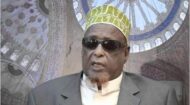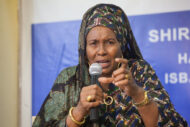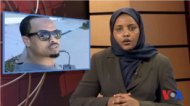Commentary by Abdulkhaleq Abdulla: “US, Islamists and Arab Gulf States”
The rise of political Islam is the big story of the hour in places like Egyptand the other Arab Spring states. However, the way in which the Obama administration has decided to engage the phenomenal rise of Muslim Brotherhood is raising many questions and few concerns throughout the region, especially among some Arab Gulf States – supposedly the most trusted US allies in the Arab world.
There is a general apprehension towards Washington going the extra mile in empowering the Islamists and treating them as new political allies. The message coming from Washington is that political Islam is the now darling and the choice of the moment. Many are rightly bewildered to see this sudden change in attitude and to see the red-carpet treatment given to Muslim Brotherhood delegations whenever they visit Washington.
The Obama administration sees political Islam as a moderate force capable of taming the angry Arab, bring back political stability and preserve the status quo. Washington seems to think that the region stretching fromAfghanistan to Morocco is essentially an Islamic region and should be ruled by Islamists.
This new Washington consensus is not only alarming to many, but is fundamentally naive for several reasons. Firstly, the assumption that Arab Spring Islamists are politically moderate, socially progressive forces capable of living up to the challenges of building stable and prosperous democracies is yet to be put to the test. Additionally, to so naively trust them as new friends and possible allies and engage them in a serious strategic dialogue does not make political sense. Past American experience with Islamists, such as the Mujahideen in Afghanistan, shows that they can turn against the USwith a vengeance at the first available opportunity.
Secondly, though Islamists came to power in some of the freest elections in recent memory, for the US to think that Islamists are the only credible force around is ridiculous. The post-Arab Spring landscape is full of political dynamism and forces of change such as liberals, secularists, nationalists are far from being politically defeated or marginalised. Above all, there is also the vast majority of independents, mostly Arab youth, who played a pivotal role in ending decades of political stagnation in the Arab world.
For Washington to simply neglect them is a huge political blunder. The Islamists came to power because people voted with their hearts in the first round of elections. The alternatives to Islamists are already making a strong comeback in Egypt, Tunisia and have won convincingly in Libya. To give Islamists a free ride and consider them the final choice of the people is not very imaginative.
Thirdly, the real concern is not just that Washington seems to be somewhat naively embracing the Islamists. What is more alarming is the suddenness of the policy shift. Washington looks pathetically opportunistic in making a 180-degree turn to embrace the Muslim Brotherhood as the new norm in Arab politics. To go from the long-held position of demonising Islamists to treat them like new political darlings is too much to stomach.
Fourthly, from the Arab Gulf states` perspective, two issues are at stake: How fast the US deserted old allies and how fast it now rolls the red carpet out to Islamists. The folks at this end are asking what the US is really up to and would it do the same with the visibly emboldened Gulf Islamists? More worryingly, decision makers in various Gulf capitals are asking, would the USalso trade allies if it ever strikes a grand bargain with Iran, which is a top priority for the Obama administration in its second term? Where would that leave the Arab Gulf states? Flirting with Islamists is bad, but going for a grand bargain with Tehran is crossing an unforgivable red line.
Granted that the foundations of US-Gulf relations are as solid as ever and because of a belligerent Iran, there is a mutual urge to upgrade that relationship. However, differences over how to handle the rise of Islamists are mounting and trust of America is not necessarily at its best in some Gulf capitals.
Wisely, the Arab Gulf states are already diversifying their energy and security portfolios. At a time when everyone is preparing for the post-America world, they cannot afford leaving all their options in one basket.
Going East and moving steadily towards Asia is just one of the many options away from the unhealthy dependence on America. There is a growing belief that America is in retreat and is becoming increasingly inward looking. Asiais the future and the new global economic and financial centre.
The world is fast changing and the Arab Gulf states are fast adapting to the new regional and global realities. They are acting more independently and are no longer the little duckling of the last century, desperately in need of Uncle Sam`s protection. They are also building vast networks of new friends and allies and thinking of new strategic options and are ready to take calculated risks of their own.
The message from the Gulf is clear. It is very difficult to trust America that does not stand by its friends in times of need. It is not very reassuring to seeAmerica that swaps allies at the speed of light. All this comes at time when the US needs the full cooperation of the Arab Gulf states, much more than the Arab Gulf states need America that is banking on Arab Spring Islamists as its new allies in the region.
Source: Gulf News website, Dubai, in English 27 Nov 12
© 2012 The British Broadcasting Corporation. All Rights Reserved.
The bright, shiny tinderboxes of the Persian Gulf
Pankaj Mishra
TODAY (Singapore)
November 20, 2012
Touring the luxurious campus of the American University of Sharjah last week, I was yet again struck by what money, especially petrodollars, can buy.
Sharjah is an emirate of the United Arab Emirates (UAE), located adjacent toAbu Dhabi. Designed by the ruler of Sharjah, Sultan bin Mohamed Al Qasimi, one of the more enlightened of the region`s many autocrats, the university`s grand buildings self-consciously invoke the glory days of Islamic architecture.
They are also part of a larger regional trend of patriarchy-supervised modernisation. Gulf rulers, from the sober Sultan of Oman, Qaboos bin Said Al Said, the oldest serving ruler in the Arab world, to Dubai`s flashy Mohammed bin Rashid Al Maktoum, deploy a range of self-descriptions —philosopher-king, philosopher-poet, chief executive officer — as they present themselves ushering, with cautious gradualism, their wards into the modern world.
The American University is one of many imposing institutions in Sharjah`sUniversity City. A few miles away, Dubai has been equipped with its own educational Valhalla. Abu Dhabi will soon have its own Louvre and Guggenheim branch museums.
Down the coast, the Emir of Qatar is experimenting, more ambitiously, with artificial clouds, each worth half a million dollars, that can be conjured during the 2022 FIFA World Cup to provide shade to teams exposed to the intolerable summer heat of the Gulf.
CASH INFUSION
Wealth, so colossal and concentrated, attracts more wealth. Struggling with debt and a real estate implosion since 2008, Dubai has been partially reprieved by an infusion of panicky cash rushing out of the countries transformed by the Arab Spring; the warlords, mafia dons and new plutocrats of Afghanistan also find Dubai the safest place in which to store their loot.
Local citizens have seemed content to receive their share of the largesse of oil and gas revenues — Qatar`s per-capita income is the highest in the world. Wealthy expatriates don`t seem to mind their unalterably temporary and vulnerable position so long as they can earn and splurge, tax-free.
Of course, no such trade-offs are available to the vast, though disturbingly invisible, menial labour force from India, Pakistan, Bangladesh and Sri Lanka. Along with Russian prostitutes and Filipino maids, these toilers in the Gulf netherworld embody a particularly wretched form of neo-slavery.
Visiting the Gulf monarchies over the years, I have heard numerous tales of merciless exploitation, denunciations of the overpaid and idle native citizens and grievances about the near- total absence of anything resembling the rule of law.
In some ways, the Gulf seems to combine the worst of the last century`s dominant ideologies, capitalism and socialism. Here, you can find both a small minority accumulating wealth without responsibility and an absurdly generous welfare system that breeds unmotivated and unproductive citizens.
The fragile balance is maintained by the earliest beneficiaries of the world`s dependence on fossil fuels: the tribes and sheikhs, who under Ottoman and then British suzerainty carved out spheres of influence for themselves and then found new patrons, protectors and clients in the American Century.
Mr Christopher Davidson, an astute observer of politics in the Gulf, describes in his important new book, After the Sheikhs: The Coming Collapse of the Gulf Monarchies, the various ways in which the Gulf monarchies have continued to buy respite from internal and external pressures. These range from endowing Western universities and donating US$100 million to the victims of Hurricane Katrina to buying up Harrods and the Chrysler Buildingand sending UAE soldiers to assist NATO troops in Afghanistan.
BELLICOSE POSTURE
Though no formidable enemy is in sight, the Gulf states indulge in extravagant arms-buying sprees designed to keep American and European politicians and armament manufacturers happy — Britain`s David Cameron just concluded a visit to the UAE ostensibly meant to hawk British weaponry. As part of a strategy to secure US support, the Gulf rulers often assume a more bellicose posture towards Iran than even Israel`s Foreign Minister Avigdor Lieberman.
The singular exception here is the Emir of Qatar, Hamad Bin Khalifa Al Thani. Hosting an American base and deploying his bombers over Libya one moment and visiting Hamas in Gaza the next, Al Thani displays a fascinating geopolitical nimbleness — and a desire to stay on whatever seems, at any given moment, the winning side of history.
Nevertheless, the hectic manoeuvring reveals an anxiety about the future of autocratic regimes in an increasingly inter-connected and politicised neighbourhood. Unlike Chinese communists, another unelected ruling class in search of legitimacy, the Gulf`s sheikhs cannot draw upon a galvanising national narrative or a glorious history of collective fall and rise. Repressive police don`t quite compensate for the lack of a party structure that reaches into the smallest village and absorbs likely dissenters.
Certainly, the Arab Spring found the Gulf rulers wholly unprepared; their first impulse was to circle the wagons. Bahrain`s ruling Al Khalifa family faced the loudest expression of political disaffection and promptly cracked down on it, assisted by Saudi Arabia. The Crown Prince of Abu Dhabi, Mohammed Bin Zayed Al Nahyan, betrayed a widely shared panic in recruiting foreign mercenaries through Blackwater (renamed Xe) in order to crush “internal revolt”.
The police chief of Dubai, Dahi Khalfan, notoriously garrulous on Twitter, has accused the Muslim Brotherhood of plotting the overthrow of Gulf monarchies. The hysteria indicates a growing fear among the potentates of the Persian Gulf. Davidson, generally cautious, is confident that “most of these regimes — at least in their present form — will be gone within the next two to five years”.
UPRISING INGREDIENTS
He warns of a domino effect “if an especially brittle monarchy succumbed to popular revolution”. And he thinks that the ingredients for a mass uprising are already present in the Gulf`s current crisis: declining natural resources, over- spending, a young population confronted with rising unemployment and widening inequalities. Though far from embracing US-style democracy, few of the bright, outspoken students I met at the university are likely to settle for the status quo.
The Gulf regimes, as we know them, may still be around in 2017. But the social contract underpinning them — in which governments bought political acquiescence through redistribution of wealth — is in danger. And their main response to a changing world seems to be panicky repression: As of last week, anyone in the UAE critical of the government and heads of state, or calling for “unlicensed protests” online, will face imprisonment.
No doubt the Gulf`s rulers will buy some extra time for themselves through such tactics. No one should be surprised as they drum up alarmist scenarios of an Iran-led Shia takeover of the region and Al Qaeda`s resurgence, sink more money into struggling European and American economies or purchase more military hardware from the West they can`t possibly use.
But the Gulf`s autocrats would do well to learn from the example of Libya`s Muammar Qaddafi. Neither large-scale bribery of the masses nor renewed business and security links with the West finally saved the longest-serving ruler in the Arab world. There are some things — political stability, above all — that money can`t buy, especially in the age of global capitalism.
© 2012. MediaCorp Press Ltd.
Gulf squeeze on opposition brings unusual alarm from Western allies
By BRIAN MURPHY
November 04, 2012
DUBAI, United Arab Emirates (AP) – The Gulf has been the slow burn of the Arab uprisings.
The fraternity of rulers in the oil-rich region has remained intact with tactics ranging from withering force in Bahrain to arrests of perceived dissenters in the United Arab Emirates. And it`s been done without too much serious blowback from their Western allies, which count on the region`s reliability as an energy supplier and military partner against Iran.
But that now could be put to the test as Gulf states attempt to muzzle voice of opposition by adopt sweeping measures, such as protest bans and clampdowns on social media.
“The Western governments have taken essentially `do what it takes` policies with the Gulf regimes,” said Christopher Davidson, an expert on Gulf affairs at Britain`s Durham University. “That requires a certain level of silence and a practice of looking the other way from the West.”
Last week, however, State Department spokesman Mark Toner issued unusually blunt criticism of a decision by Bahrain — a strategically located island country that is home to the U.S. Navy`s 5th Fleet — to temporarily outlaw all anti-government protests amid rising violence in the nearly 21-month-old uprising against the Western-backed monarchy. Early Sunday, protesters rained homemade firebombs on at least three police stations in yet another sign of the deepening tensions.
Kuwait also could bring further questions from the West over its widening clampdowns on an Islamist-led opposition ahead of Dec. 1 parliamentary elections, including bans on public gatherings of more than 20 people. Protesters, however, have defied the order and on Sunday thousands staged a march in a Kuwait City suburb as security forces countered with tear gas and stun grenades.
The UAE, meanwhile, has angrily challenged a European Parliament resolution last week that denounced “assaults, repression and intimidation” against rights activists and suspected members of an Islamist group that officials consider a threat to the state. More than 60 people have been detained in the past year in one of the quietest ongoing crackdowns of the Arab Spring, rights groups say.
And Saudi Arabia said last month it was “insulted” by a British parliament inquiry into possible Saudi human rights violations and its military assistance to Bahrain`s embattled monarchy. Saudi forces also have waged an ongoing battle against groups from the kingdom`s Shiite majority that claim they face systematic discrimination.
Across the region, bloggers and social media activists also are facing increasing pressures for violating laws against direct criticism of the sheiks and monarchs that control the Gulf. Last week, a Bahraini man was sentenced to six months in prison after being charged with insulting the king.
“The Gulf is a delicate dance for the West,” said Ali al-Ahmed, director of the Washington-based Institute of Gulf Affairs. “The Gulf leaders know they are insulated. There could be rising complaints from Washington or London about various hardline measures, but no one realistically thinks the West will do anything more than complain.”
That`s because the likely price would be too high for anything else.
The Gulf states host perhaps the highest concentration of Western military might outside NATO, including about 15,000 U.S. ground forces in Kuwait and air bases dotting the desert down to Oman. The arrangement works for both sides because of a shared concern: Iran. The West gets firepower right at Iran`s doorstep and the Gulf leaders have resident protectors.
The West also cannot ignore the rising political ambitions of the Gulf as the wider Middle East is reshaped by the Arab Spring.
Qatar, a leading backer of Libyan rebels last year and now a key supporter of the Syrian rebellion, is hosting a critical meeting this week of Syrian opposition officials. The U.S. hopes to use the gathering to overhaul the anti-Damascus forces into a new leadership with fewer Syrian exiles and more rebels commanders.
At the same time, Syria`s civil war and Iran`s nuclear program will be high on the agenda for Gulf stops this week by British Prime Minister David Cameron and French President Francois Hollande. Those visits will also be opportunities for Gulf leaders to restate their views on the internal threats.
They fall in two directions: Suspected Iranian plots and fears about Islamists emboldened by Arab Spring victories in Egypt and elsewhere.
Authorities in Bahrain – facing nonstop clashes and unrest since February 2011 – have increasingly blamed Shiite power Iran or its proxies for encouraging the protests by the island nation`s Shiite majority. No clear evidence has emerged to back up the claims – and Iran denies any direct role – but it has become a central narrative of the six-nation Gulf Cooperation Council anchored by regional Sunni power Saudi Arabia.
It`s also one that boxes Washington and other Western allies into a corner. The U.S. has urged dialogue in Bahrain, where more than 50 people have died in the unrest. But any clear support for the Shiite-led opposition could seriously disrupt relations with Gulf nations and possibly complicate the future of U.S. bases in the region.
In the UAE, the main target is an Islamist group, al-Islah, that authorities worry could try to undermine the control of the ruling clans in Dubai, Abu Dhabi and other emirates. Al-Islah says it only seeks a wider public voice in the country`s affairs – but even that is considered dangerous territory in a nation that allows no political parties and swiftly stamps out any signs of public protests.
Dubai`s police chief, Lt. Gen. Dahi Khalfan Tamim, warned in September of an “international plot” to overthrow the governments of Gulf Arab countries by Islamist factions inspired by the rise to power of the Muslim Brotherhood in Egypt.
“The Muslim Brotherhood does not believe in the nation state,” said the UAE`s foreign minister, Sheik Abdullah bin Zayed Al Nahyan, last month. “It does not believe in the sovereignty of the state.”
Curiously, the claim came just weeks after the UAE`s president, Sheik Khalifa bin Zayed Al Nahyan, offered an invitation to Egyptian President, Mohammed Morsi to visit Abu Dhabi.
The belief in a Muslim Brotherhood threats runs so deep that the Gulf Cooperation Council – Bahrain, Kuwait, Oman, Qatar, Saudi Arabia and the UAE – are expected to make it a main topic of talks when leaders meet next month.
By that time, however, Kuwait will have held its next election for parliament, by far the most politically powerful legislature of the Gulf Arab states. Opposition groups, led by Islamists and backers from Kuwait`s powerful tribes, have two main paths ahead: Either seek to reclaim control of the chamber or boycott the voting in protest of the tightening crackdowns.
Hours before a planned protest march on Sunday – in defiance of bans against street rallies – social media sites were awash with appeals to put aside concerns over the tear gas and stun grenades used against the last major demonstration late last month. In an apparent attempt to outwit authorities, organizers switched the location at the last minute from KuwaitCity to a suburb.
Some posts cited patriotic songs from a generation ago. “We are the confident steps on the path of hope, like a strong wind that doesn`t tire.”
Associated Press writer Hussain al-Qatari in Kuwait City contributed to this report.
© 2012. The Associated Press. All Rights Reserved.
The EU and its use of rights groups against other states
Arab News
November 03, 2012
I had the opportunity to read two reports on the relationship between the Muslim Brotherhood and Britain and their relationship with the Freemason movement. I also read a report on Rashin Ghanoshi and Khairat Al-Shater – two leading figures of the Muslim Brotherhood who have used religion as a cover for business and politics.
The latter is far from religion and closer to being a secular businessman. A friend of mine confided to me that Al-Shater told American officials they do not have to spend their money on TV stations or radio programs to improve their image in the Islamic world. He offered to help them with one single religious verdict in exchange for money.
Al-Shater believes in using all available elements of force and established a special lobby within the Muslim Brotherhood. In fact, he was behind the election of Muhammad Mursi as a member of the Office of Guidance. Al-Shater dominated key economic activities in Egypt to the extent that renowned sociologist Saad Eddin Ibrahim said that the Brothers have switched from control over the revolution to control over wealth.
The above statement is not without evidence. Al-Shater confirmed at a meeting of the Office of Guidance that he received a green light to control one of the Gulf countries; either Kuwait or the United Arab Emirates. Their attempt in the UAE failed as 64 people who attempted a coup were arrested. Many were Egyptian and Syrian Brothers who came to the UAEs after years of inactivity in their home countries.
Information leaks allege that Yusuf Al-Qaradawi was also involved in the revolution. This is said to be the reason behind the disagreement betweenEgypt and the UAE. Dahi Khalfan, head of the Dubai police, spoke about the externally supported Brother project in the Gulf. Failing to affect the required change in the UAE, they tried to do the same in Kuwait but the Kuwaitis were able to put a stop to it.
In another meeting, Al-Shater was reported to have said he would blackmail the Gulf countries and have sleeper cells work in the Gulf for Egypt to gain billions of dollars. He thinks that talking about religion will justify his wrongdoings as if the end justifies the means. Because he was emboldened, he paid a secret visit to the Emirates and announced in Cairo he would come back with several projects. When he arrived in the Emirates, he was denied a meeting with UAE Foreign Minister Sheikh Abdullah Bin Zayed until he offered a public apology and promised not to interfere in their country`s internal affairs. He also tried to contact the families of the 64 arrested, a move that forced the UAE authorities to expel him.
It is worth noting that Al-Shater believes in reaching out to foreign human rights and civil society organizations. Al-Shater, who lived in London andWashington for years, said the Gulf countries that refused to pay Egypt would be subjected to criticism from these foreign human rights organizations. He used his relations with the British Parliament and the European Parliament to open files concerning human rights in Bahrain and the Emirates. As the issue was exposed, the European Parliament modified a draft resolution on human rights in the Emirates while the British Parliament reconsidered its stance on human rights in Bahrain. The modifications added by the European Parliament to the initial draft revealed their secret relations with the Muslim Brotherhood. The European Parliament was hesitant to play into the hands of the Muslim Brotherhood. While referring to the 64 arrested in the UAE the draft includes issues such as women and labor rights.
Human Rights Watch and Amnesty International are organizations that can be used as tools by European countries. Add to these the Guardian newspaper. This newspaper is acting like a mouthpiece for the Muslim Brotherhood.
Western countries use these organizations to disparage a country and as a result European countries derive concessions and sign contracts with the victim country on their terms. This is now being replicated by the Muslim Brothers.
Our people no longer pay attention to these organizations. We know that some Western embassies offer any adventurist political asylum. The objective is not linked to humanitarian issue as much as it is for using him or her as a tool to serve the interest of these countries. They may instigate a person and help him become prominent. The person may seem to be a vocal critic of the West and Israel. But he is, in fact, working secretly for them. This is a practice of the past and our people now understand such ploys.
The Gulf countries may, under popular pressure, suspend negotiations with the European community after the discovery of their double standard. These countries may create a united Gulf fund for economic support and use it to punish and politically deprive those who may try to interfere in their internal affairs. We all know that double standard is part of European political strategy and it shows the European mindset that is based on opportunism. The Gulf countries should reconsider their relations with these countries and keep their own interests above everything. Europeans will realize if Gulf countries start using the economic card. Look at China, for example, despite its differences with our policies and its adherence to its principles in dealing with others, it makes no attempt to mess in others` internal affairs. This country as well as Russia – in spite of our poor opinion about its Middle Eastpolicies – are countries that have a promising future in view of the attitude of European and Western countries.
In the nutshell, the European Parliament has been exposed as a tool to serve European interests. Its latest position exposed its lack of commitment to democratic values that European countries brag about. We know that these civil society organizations are nothing but outposts for Western intelligence agencies in this part of the world.
© Copyright: Arab News © 2012. Provided by Syndigate.info, an Albawaba.com company

 All Posts
All Posts










